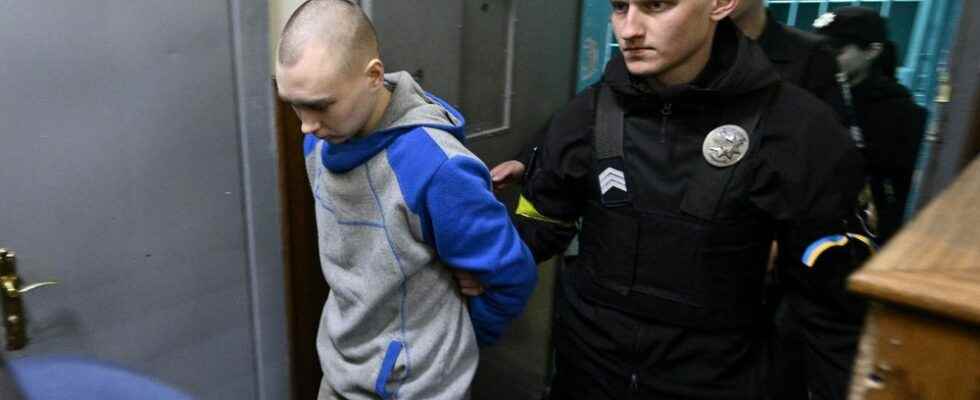What will become of the Azovstal factory fighters? Two weeks after their surrender, concern over the fate of Mariupol’s last defenders continues unabated. The more than 2,400 Ukrainian soldiers, who agreed to surrender between May 16 and May 20 after three months of fierce fighting, are believed to be currently held by pro-Russian forces from the self-declared Donetsk Republic (DNR) in the east of the country. On May 23, the head of this separatist territory, Denis Pushilin, had indicated that he planned “the organization of an international tribunal”, in connection with Russia, to judge them.
The soldiers of the Azov regiment – presented since the start of the conflict as a neo-Nazi organization by Moscow – already seem particularly threatened. All “will be the subject of criminal investigations” affirmed Monday, May 30 on Russian television the Minister of Justice of the DNR, Yuri Sirovatko, specifying that they could incur “the death penalty”. “The soldiers of the Azov regiment are symbolic for Russia, which has based its entire operation on the “denazification” of Ukraine, underlines Carole Grimaud Potter, founder of the Center for Russia and Eastern Europe Research, based in Geneva. We can therefore s expect them to face much harsher sentences than soldiers from other units captured in Mariupol.”
Worrying signals
A few days after the fall of the port city, kyiv, which also opened the first trials of Russian soldiers in mid-May, announced its intention to carry out prisoner exchanges. “We will consider all this after those who surrendered have been judged, after a verdict has been pronounced. Before that, talks about an exchange are premature,” said Russian Deputy Foreign Minister Andrei Roudenko in return. , May 25. As for kyiv’s proposal to exchange members of the Azov regiment for Viktor Medvedchuk – a Ukrainian politician close to Vladimir Putin arrested in mid-April in Ukraine – Moscow has so far not responded.
Russian soldier Vadim Chichimarine, accused of shooting dead a Ukrainian civilian, arrives for his trial in the courtroom of the kyiv court, May 18, 2022 in Ukraine
afp.com/Genya SAVILOV
Internationally, pressure is mounting on Russia. During a telephone interview with Vladimir Putin on Sunday May 29, Emmanuel Macron and Olaf Scholz pleaded for the release of all soldiers from the Azovstal factory. According to a statement from the German Chancellery, the two European leaders “have taken positive note of the Russian President’s commitment to treat captured combatants in accordance with international humanitarian law, in particular the Geneva Conventions, and to guarantee unhindered access to International Committee of the Red Cross.”
Other signals from Russia, however, are worrying. As early as May 16, the president of the Duma, the lower house of the Russian Parliament, had asked Russian deputies to vote on a motion prohibiting the exchange of fighters from the Azovstal factory for Russian prisoners of war. Calling the Mariupol defenders “Nazi beasts”, the chairman of the chamber’s international affairs committee, Leonid Slutsky, went further by asking for an exception to the moratorium on the death penalty in Russia, so that they could be executed if found guilty of war crimes.
“Make an example”
“It is likely that Putin seeks to set an example with the fighters of the Azov regiment, insofar as it would be a blow to the morale of the Ukrainian forces who consider them heroes,” said Russian historian Galia Ackerman. Moreover, Putin has repeatedly denounced a genocide of the Russian-speaking populations in the Donbass, so it is to be feared that the investigators will seek to validate this false assertion by fabricating evidence. Aware of the suspicions that will weigh on these trials, the head of the DNR, Denis Pouchiline, declared on May 24 that he wanted “a maximum number of representatives from different countries”, including Western ones, to be able to take part.
Legally, Ukrainian soldiers detained by the Russian army benefit from the protections granted by the status of “prisoner of war” defined by the Geneva Convention of 1949. And this, even if Russia has not officially declared war on the ‘Ukraine. Moscow, however, said it considers the fighters of the Azov regiment to be “terrorists” to be tried as such. “We can fear that the Geneva Convention does not apply to the soldiers of the Azov regiment, if they are considered by Russia as terrorists, points out Carole Grimaud Potter. Therefore, we can fear that they will be victims of bad treatment, even torture.”
